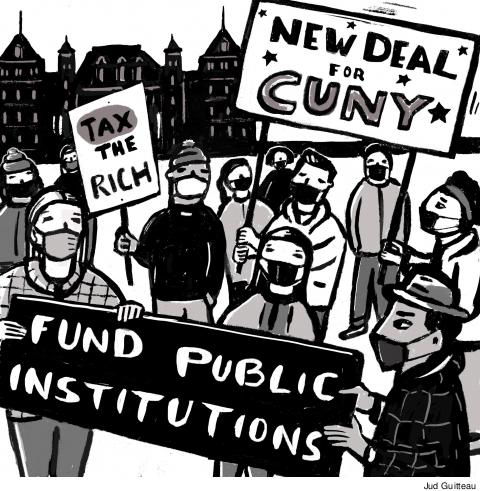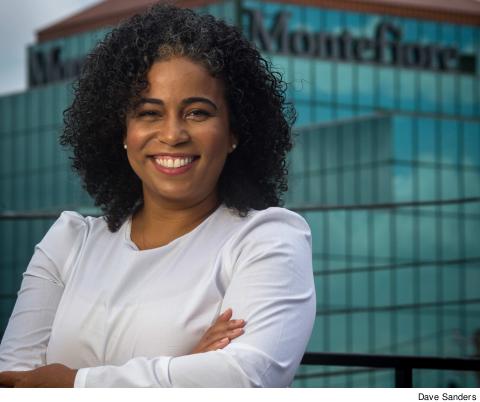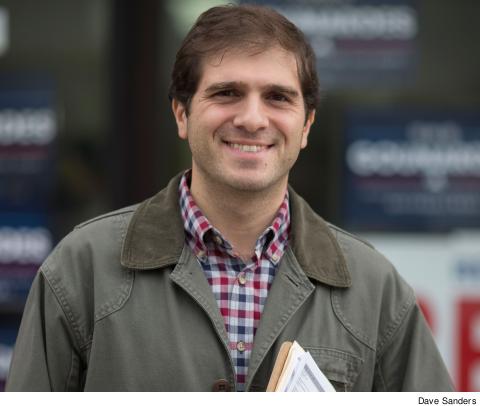A campaign for safety and better funding

Joined by 22 state lawmakers, more than 600 supporters and dozens of reporters during a press conference, the PSC unveiled perhaps its boldest plan yet: A New Deal for CUNY, a bill that would not only avert cuts to CUNY but make CUNY free, increase the number of faculty and staff and create a more accessible system of public higher education. (See summary of the ND4C)
 |
 |
Members are motivated – fighting for the New Deal for CUNY is a major campaign for the union in 2021. But it isn’t the only one. In the coming weeks, members are fighting to prevent brutal state budget cuts to CUNY, and the union is advocating for higher taxes on the rich to fund education and other services. Once the union averts these cuts, the New Deal CUNY will go above and beyond mere status-quo funding. Beyond that, members are fighting to ensure that if there is a reopening of campuses in the Fall that it will be done safely.
ANTI-RACISM
At the center of this campaign is anti-racism. The historic disinvestment of CUNY is part of a ruling-class austerity agenda that hoards high-quality college education. For two decades, the PSC’s central message has been that public higher education should be available to all. And the safety campaign is about fighting racism. As PSC sources said, many of the PSC-represented workers who were required to work on campus throughout the pandemic are disproportionately HEOs and CLTs, many of them in entry-level titles that have higher proportions of people of color than in faculty positions. And CUNY’s student body is overwhelmingly made up of people of color, members of the same communities that have been hardest hit by COVID-19 in the last year.
The union is organizing on multiple fronts for this campaign. In addition to lobbying, press events and rallies, members are having one-on-one conversations with their colleagues about strike readiness and assessing members’ readiness to engage in militant action. Members are taking on this enormous task while doing the day-to-day work of the union, as well as waging other campaigns, like the fight against increasing class sizes and the layoffs of adjuncts.
NO CUTS TO CUNY
Union members are mobilizing, as they do each year, to press state lawmakers to fully fund CUNY and defend it from budget cuts proposed by the governor. This year, the union is a part of a vast revenue coalition that is working with progressive lawmakers to impose new taxes on the wealthiest to alleviate the state’s budget crunch and have more money for services and education.
A union analysis of the governor’s budget proposal this year shows that there will be a 5% reduction in spending at CUNY senior colleges. More troubling is that the proposal includes language that would offer tuition discounts to students for a variety of programs, including the choice to do online-only education. PSC officials and other education advocates fear that this could have a long-term effect of encouraging students toward online education, downsizing the physical operation of CUNY campuses in the future.
A PSC analysis of the governor’s budget proposal, also shows that while the governor withheld 20% of the state’s allocation to CUNY in 2020, he will continue to withhold 5%. This might sound like a partial victory for CUNY faculty, staff and students, but the damage has been done. Adjuncts have been laid off, class sizes have ballooned and other cuts have been made at campuses. If the money comes through it will do little for the workers and the students who have suffered as a result of the original 20% withholding.
PSC President Barbara Bowen pressed the union’s case to the State Legislature on February 4, urging that the governor’s proposed cuts be rejected and that “the Base Aid rate of funding for community colleges should be increased by a total of $500 per FTE [full-time equivalent]: an increase of $250 per FTE to fund the needs shared by CUNY and the SUNY community colleges,” and other improvements.
Here’s the good news: many lawmakers who heard the union’s testimony supported the calls to invest in CUNY and to enact new taxes on the rich. “We have to make it work, and we have to be smart about it,” said State Senator Robert Jackson. “We have to raise revenue.”
NEW DEAL FOR CUNY
On February 5, PSC members and other CUNY advocates joined State Senator Andrew Gounardes and Assemblymember Karines Reyes in introducing the New Deal for CUNY, legislation that a union statement said will, if enacted:
- Provide a five-year phase-in of funds to save CUNY.
- Make CUNY free again (5 years – $796 million).
- Increase mental health and academic counseling services for students (5 years – $40 million).
- Increase the number of full-time faculty and professionalize adjunct pay (5 years – $636 million).
- Invest in capital projects to renew CUNY buildings for greater safety and capacity.
Bowen said that the bill would “increase the number of full-time faculty by 5,000 positions,” which would also allow for the university to recruit a more diverse teaching staff, while the bill would also grant “parity pay for adjuncts.” She added that in addition to “making CUNY free,” the bill would increase the advising staff because the university is “woefully underserved by academic advisors and mental- health advisors.”
Student activist groups, including the University Student Senate, have joined the PSC by making the New Deal for CUNY a central priority this year. In addition to the two cosponsors, dozens of state lawmakers joined the PSC press event to voice their support for the bill. Union members and students will spend the next weeks and months pushing this issue.
FOR A SAFE REOPENING
CUNY Chancellor Félix V. Matos Rodríguez didn’t mince words when he said in a statement in January that “CUNY will plan for a safe and gradual return to mostly in-person instruction and support services in time for the start of classes in Fall 2021.”
CUNY administration has made it clear: with the rollout of the COVID-19 vaccines the university is beginning the transition away from remote work toward a post-pandemic return to normalcy.
“If CUNY is working toward a reopening on campus in the Fall, everybody we represent and everyone at the colleges should have the opportunity to be vaccinated,” Bowen said.
The PSC – along with the SUNY’s United University Professions and the union’s state affiliate, New York State United Teachers – successfully pushed the state to include higher education instructors in the Phase 1B priority category for vaccination. However, the PSC is pushing for that category to be broader. “The PSC calls on New York State to clarify that ‘instructors’ includes all on-campus instructional staff – professors, lecturers, librarians, registrars, laboratory assistants, counselors and all other instructional staff members represented by the PSC,” Bowen said. “Many of these dedicated employees have been working in person, without any option to work remotely, since the pandemic began.”
WINNING LEAVE
The union said in a statement that the union has “won agreement by CUNY management to provide two hours of paid leave time for all full-time CUNY employees who have a vaccination appointment, for a total of four hours per person, covering two doses of the vaccine. The union will continue to press to achieve the same provision for part-time faculty and staff,” and that “The PSC has offered to facilitate delivery of vaccines to our members, in response to the governor’s statement that unions could play this role. To date, requests to both New York State and New York City governments are awaiting responses.”
The union held a town hall event on vaccinations with a representative of the city’s department of health in February.
Rank-and-file members are getting more involved in the union’s Health and Safety Watchdogs, in part due to the pandemic. Such organizing is going to be essential, because many members believe vaccination is just the first step. For example, some higher education officers and college laboratory technicians have felt they are not being prioritized when it comes to the university’s safe reopening plan.
“Some HEOs were already asked to return before the campus was ready. Reopening plans look good ‘in writing’ but when some HEOs returned they were not working in areas with proper social distancing and were told to bring their own PPE [personal protective equipment]. Even before the pandemic some offices were very cramped. Many HEOs cannot trust it will be better when they return,” said Cindy Bink, the PSC chapter chair for HEOs. “There are a number of HEOs with fears over returning to work and facing the risk of infection, particularly those with immune issues or family members with immune issues.”
Bink, the director of counseling at City Tech, continued, “Governor Andrew Cuomo offered vaccines to in-person teaching faculty, but did not consider staff who have already returned to campuses. Many people are worried that our buildings are already in disrepair and will not be ready for us. With limited CUNY funds, HEOs know that we must fight any attempt to return before it is safe. Our message is: ‘Fix our buildings, get us vaccinated, keep us safe.’”
For years before the pandemic, Clarion has reported on building deterioration, mold, busted pipes, out-of-order bathrooms and more at countless campuses. Given the issues surrounding ventilation, social distancing and general cleanliness at CUNY, members are pushing not just for more vaccines, but for more federal and state money to be used to fix long-standing physical issues on campus.
SAFE BUILDINGS?
“CCNY [City College of New York] has many older buildings and it is structurally impossible to bring enough outside fresh air into them to make the buildings safe for us to work. Not to mention, the college’s North Academic Center’s air conditioning was broken even before it was closed down last March,” said Carol Huang, PSC City College chapter chair. “Cleaning up is another issue, not just reopening.”
Scott Cally, PSC chapter chair at Kingsborough Community College, echoed those concerns, saying, “Any large-scale return to campus must be contingent on the availability of COVID vaccines well in advance of the start of the semester to all members of the college community: faculty, staff and students. We also need the financial and logistical resources to ensure that appropriate health and safety guidelines are followed along with proper maintenance of our HVAC system campus-wide.”

